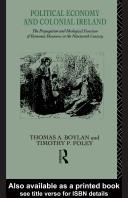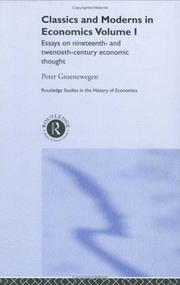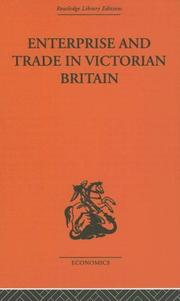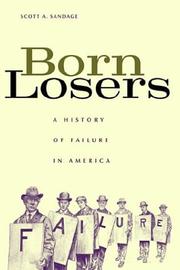| Listing 1 - 10 of 140 | << page >> |
Sort by
|

ISBN: 041506628X 113800930X 1280150904 0203981294 1134920407 9780203981290 9786610150908 6610150907 9780415066280 9781134920402 9781280150906 9781134920358 9781134920396 9781138009301 1134920393 Year: 1992 Publisher: London [England] ; New York : Routledge,
Abstract | Keywords | Export | Availability | Bookmark
 Loading...
Loading...Choose an application
- Reference Manager
- EndNote
- RefWorks (Direct export to RefWorks)
`I believe that next to good Religious education, a sound knowledge of Political Economy would tend as much to tranquilize this country, if not more, than any other branch of knowledge that can be taught in schools.' - Cork Schools Inspector, 1853 In a nineteenth century Ireland that was divided socially, economically, politically and denominationally, consensus was sought in the new discipline of political economy, which claimed to be scientifically impartial and to transcend all divisions. The authors explore the ideological mission of political economy, and the
Economics. --- Economics - Ireland - History - 19th century. --- Economics --- Business & Economics --- Economic Theory --- History --- Study and teaching (Higher) --- Economic theory --- Political economy --- Social sciences --- Economic man --- Ireland --- 19th century --- Economics - Study and teaching (Higher) - Ireland - History - 19th century.
Book
Year: 2000 Publisher: Logan : Utah State University Press,
Abstract | Keywords | Export | Availability | Bookmark
 Loading...
Loading...Choose an application
- Reference Manager
- EndNote
- RefWorks (Direct export to RefWorks)
Over the Rim is the first book about an important but little-known expedition sent by Brigham Young to explore southern Utah. Led by Mormon apostle Parley P. Pratt, the party traveled from Salt Lake City south across the rim of the Great Basin to the Virgin River near future St. George. They brought back to Mormon leaders their first detailed portrait of the country to the south that the church planned to settle.
Book
ISBN: 3839463408 Year: 2022 Publisher: Bielefeld : transcript,
Abstract | Keywords | Export | Availability | Bookmark
 Loading...
Loading...Choose an application
- Reference Manager
- EndNote
- RefWorks (Direct export to RefWorks)
Die Feststellung des Todes ist nicht unbedingt trivial und die Angst vor dem Begraben scheintoter Menschen hat Mitte des 18. Jahrhunderts ganz Europa verunsichert. Leichenhäuser sollten Abhilfe schaffen und eine Absicherung bei der Unterscheidung zwischen Leben und Tod gewährleisten. Die erste Einrichtung dieser Art in Berlin wurde 1794 etabliert. Nina Kreibig arbeitet die Kultur- und Sozialgeschichte der neuen Institutionen auf und analysiert systematisch ihren Umgang mit und die Bewertung von Verstorbenen im Berlin des 19. Jahrhundert.
19th Century. --- Berlin. --- Cultural History. --- Fear. --- German History. --- History of the 19th Century. --- History. --- Institutionalization. --- Medicine. --- Mortuary. --- Seemsod. --- Social History. --- HISTORY / Europe / Germany.

ISBN: 0415301661 041530167X 0415754003 0203460731 1280403489 0203458796 0415754011 0203460693 1280403462 0203458648 1134417454 1134417446 0429232365 1134417381 1134417373 9780415301664 Year: 2003 Volume: 57 Publisher: London Routledge
Abstract | Keywords | Export | Availability | Bookmark
 Loading...
Loading...Choose an application
- Reference Manager
- EndNote
- RefWorks (Direct export to RefWorks)
This second volume of essays on nineteenth and twentieth century economic thought, complements the first and continues the high standards of scholarship and academic rigour.
Economic schools --- anno 1800-1999 --- Economics --- History --- Economics - History - 19th century --- Economics - History - 20th century

ISBN: 0415607051 1315888890 1134558279 0415313058 1299998194 9781134558278 9781315888897 9781134558414 1134558414 9781134558346 1134558341 9780415607056 9780415313056 9780415313025 Year: 2003 Publisher: London
Abstract | Keywords | Export | Availability | Bookmark
 Loading...
Loading...Choose an application
- Reference Manager
- EndNote
- RefWorks (Direct export to RefWorks)
The essays in this book focus on the controversies concerning Britain's economic performance between the mid-nineteenth century and the First World War. The overriding theme is that Britain's own resources were consistently more productive, more resilient and more successful than is normally assumed. And if the economy's achievement was considerable, the influence on it of external factors (trade, international competition, policy) were much less significant than is normally supposed.
The book is structured as follows: Part One: The Method of Historical Economics Part Two: Enterprise in
Book
ISBN: 3839457572 Year: 2021 Publisher: Bielefeld transcript Verlag
Abstract | Keywords | Export | Availability | Bookmark
 Loading...
Loading...Choose an application
- Reference Manager
- EndNote
- RefWorks (Direct export to RefWorks)
»Der Bazar« war zwischen 1854 und 1900 eine der im Bürgertum bekanntesten und meistgelesenen Zeitschriften, die neben Themen wie Mode und Handarbeiten auch die Rolle der Frau diskutierte. Was ist die Natur der Frau? Welche Art der weiblichen Bildung ist angemessen? Welche Lebensentwürfe sind neben dem der Ehefrau und Mutter noch denkbar? Diese und weitere Fragen werden im »Bazar« über Jahrzehnte hinweg verhandelt. Anhand der von konservativ bis liberal reichenden Standpunkte untersucht Barbara Krautwald die sich darin widerspiegelnden sozialen Entwicklungen von generellem weiblichen Selbstverständnis bis hin zum Frauenstudium.
Bürgertum; Geschlechtergeschichte; Frauenbild; 19. Jahrhundert; Zeitschrift; Bazar; Emanzipation; Geschlecht; Kulturgeschichte; Kultur; Gender Studies; Geschichte des 19. Jahrhunderts; Geschichtswissenschaft; Bourgeoisie; Gender History; Woman; 19th Century; Magazin; Emancipation; Gender; Cultural History; Culture; History of the 19th Century; History --- 19th Century. --- Bazar. --- Cultural History. --- Culture. --- Emancipation. --- Gender History. --- Gender Studies. --- Gender. --- History of the 19th Century. --- History. --- Magazin. --- Woman.
Book
ISBN: 9789633867549 9633867541 Year: 2024 Publisher: Budapest : Central European University Press,
Abstract | Keywords | Export | Availability | Bookmark
 Loading...
Loading...Choose an application
- Reference Manager
- EndNote
- RefWorks (Direct export to RefWorks)
Through a skillful combination of economic and cultural history, this book describes the impact on Moldavia and Wallachia of steam navigation on the Danube. The Danube route integrated the two principalities into a dense network of European roads and waterways. From the 1830s to the 1860s, steamboat transport transformed time and space for the areas that benefited from regular services. River traffic accelerated urban development along the Lower Danube and contributed directly to institutional modernization in one of Europe’s peripheries. Beyond technological advances and the transportation of goods on a trans-imperial waterway, steamboat travel revolutionized human interactions, too. The book offers a fascinating insight into the social and cultural milieu of the nineteenth century, drawing on first-hand accounts of Danube cruising. Describing the story of travelers who interacted, met, and visited the places they stopped, Constantin Ardeleanu creates a transnational history of travel up and down the Danube from Vienna to Constantinople. The pleasures and sometimes the travails of the travelers unfold against a backdrop of technical and economic transformation in the crucial period of modernization.
River steamers --- Romanians --- Travelers --- HISTORY / Modern / 19th Century. --- Moldavia. --- Transportation revolution. --- Wallachia. --- quarantines. --- sociality. --- History --- Travel.

ISBN: 067401510X 067402107X 0674043057 9780674043053 9780674021075 0674267028 9780674015104 Year: 2006 Publisher: Cambridge, Mass. London
Abstract | Keywords | Export | Availability | Bookmark
 Loading...
Loading...Choose an application
- Reference Manager
- EndNote
- RefWorks (Direct export to RefWorks)
This is a pioneering work of American cultural history, which connects everyday attitudes and anxieties about failure to lofty ideals of individualism and salesmanship of self. Sandage's storytelling will resonate with all of us as it brings to life forgotten men and women who wrestled with The Loser--the label and the experience--in the days when American capitalism was building a nation of winners.
Social values --- Losers --- Failure (Psychology) --- Capitalism --- Identity (Psychology) --- Stigma (Social psychology) --- Social status --- History --- Social aspects --- Valeurs sociales --- Perdants --- Echec (Psychologie) --- Capitalisme --- Stigmates (Psychologie sociale) --- Histoire --- Aspect social --- Social standing --- Socio-economic status --- Socioeconomic status --- Standing, Social --- Status, Social --- Power (Social sciences) --- Prestige --- Shame --- Social psychology --- Personal identity --- Personality --- Self --- Ego (Psychology) --- Individuality --- Market economy --- Economics --- Profit --- Capital --- Losing (Psychology) --- Psychology --- Fear of failure --- Success --- Values --- United States --- 19th century --- Social values - United States - History - 19th century --- Losers - United States - History - 19th century --- Failure (Psychology) - United States - History - 19th century --- Capitalism - Social aspects - United States - History - 19th century --- Identity (Psychology) - United States - History - 19th century --- Social status - United States - History - 19th century
Book
ISBN: 0813041740 0813043697 081304393X 9780813043692 9780813041742 Year: 2012 Publisher: Gainesville University Press of Florida
Abstract | Keywords | Export | Availability | Bookmark
 Loading...
Loading...Choose an application
- Reference Manager
- EndNote
- RefWorks (Direct export to RefWorks)
In the wake of the War of 1812, the Madison and Monroe administrations oversaw the institution of a series of protective tariffs meant to shield fledgling American industries from British product ""dumping."" While southerners supported these protectionist measures early on, they quickly came to disapprove of them as severe impediments to trade with the West Indies, an important source of sugar cane and tobacco. In the decades that followed, tariffs became a hotly contested issue, the North favoring protectionism and the South advocating for free trade. In The Triumph of the Antebe
Free trade -- United States -- History -- 19th century. --- United States -- Economic conditions -- 19th century. --- Free trade --- Commerce --- Business & Economics --- International Commerce --- History --- United States --- Economic conditions --- Free trade and protection --- Trade, Free --- Trade liberalization --- International trade --- E-books
Book
ISBN: 1685710654 1685710646 Year: 2022 Publisher: Brooklyn, NY punctum books
Abstract | Keywords | Export | Availability | Bookmark
 Loading...
Loading...Choose an application
- Reference Manager
- EndNote
- RefWorks (Direct export to RefWorks)
Blending literary analysis and memoir, Something More Splendid Than Two is at once an excavation of intergenerational wounds, a dance number, a poem, and a fraught love letter from son to father that disrupts the dominant narratives surrounding the life and myth of Joaquín Murrieta. In the Mexican American imaginary, the legend of Joaquín Murrieta has been recast to explain the wounding of Mexican American men after the 1848 border formation. In these versions, Joaquín is a vigilante hero and the patriarchal father of the Chicanx movement.Revisiting the most circulated version of the Joaquín myth, The Life and Adventures of Joaquín Murieta written by Cherokee writer John Rollin Ridge, the first published Native American author in the US, Something More Splendid Than Two offers an alternative to these versions. Stitching together multiple tangled histories of Indigenous and Mexican woundings living in the margins of Ridge’s 19th-century novel, alfaro opens a queer timeline where Chicanx and Indigenous solidarities can be imagined. By attuning to the choreographies of power and patriarchy that produced readers and writers like Ridge and the author of this book, josé rivers alfaro imagines that in that endless encounter between reader and writer, both time travel and collective healing are possible.
Memoirs --- Gay & Lesbian studies --- Hispanic & Latino studies --- Indigenous peoples --- 19th-century America;borderlands;California;Chicanx Studies;Indigenous Studies;Joaquin Murrieta;Latinx Studies;Queer Studies --- 19th-century America --- borderlands --- California --- Chicanx Studies --- Indigenous Studies --- Joaquin Murrieta --- Latinx Studies --- Queer Studies
| Listing 1 - 10 of 140 | << page >> |
Sort by
|

 Search
Search Feedback
Feedback About UniCat
About UniCat  Help
Help News
News